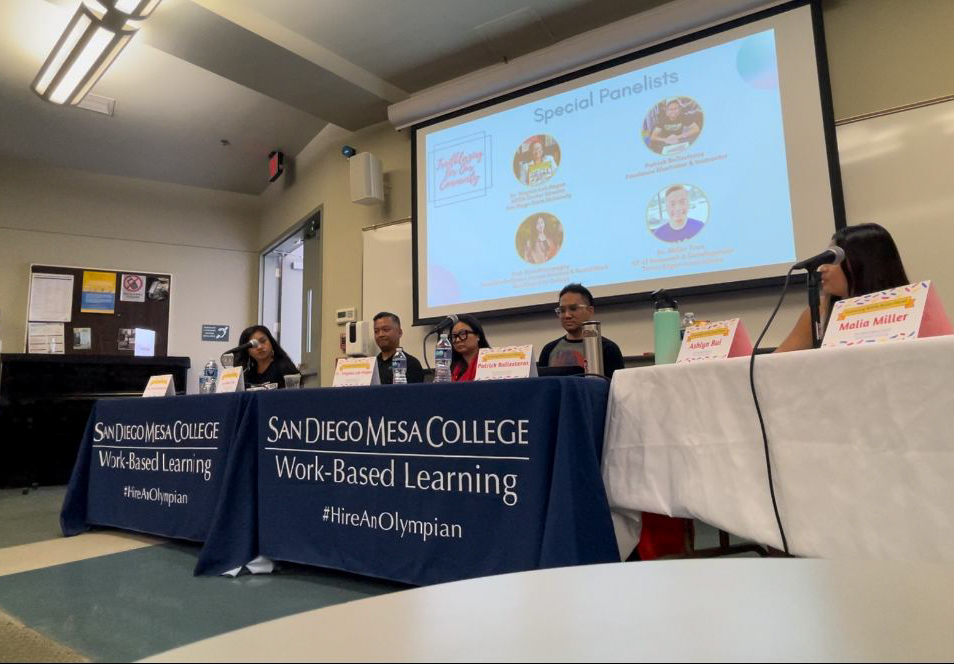A panel of influential Asian-Americans who have trailblazed in Asian and Pacific Islander American fields shared their unique strategies on Oct. 4 for embracing and excelling in predominantly white industries while maintaining their culture.
Careering While Asian panel consisted of four panelists: Dr. Virginia Loh-Hagan, Patrick Ballesteros, Kirin Amiling Macapugay and Dr. Miller Tran, with moderators Ashlyn Bui and Malia Miller asking questions on topics including how to deal with racism, choosing the right career paths, success, perspectives, and struggles.
The speakers shared their insightful perspectives on how they define success and the values they believe have contributed to their accomplishments.
Hagan, who is the inaugural director and professor of the Asian Pacific Islander Desi American (APIDA) Center at San Diego State University, spoke about the profound impact of education and knowledge. Her insights underscored the transformative power of education in shaping her personal journey toward success. Hagan emphasized that “to attain success, it is crucial to establish smaller goals rather than aiming for grand ones.”
On the other hand, Ballesteros, a Filipino freelance illustrator and instructor based in San Diego, specializing in character design and concept art, shared the story about his journey. He stated that “I was fortunate enough to always have someone to support me, pushing me to go further.” That included his family, friends, and mentors. “Growing up in a Filipino family, the norm for getting an occupation was either in engineering, medicine or joining the military,” Ballesteros added.
However, there was no one in Ballesteros’s family that introduced him to the world of art. Fortunately, he had an elder brother who had a passion for comics, and he introduced Ballesteros to the world of comics. He used to mimic his brother’s drawings and eventually, started creating his own comic stories. Ballesteros said, “While my brother pursued a career in the medical field, I took a different path. I found my own success in the field of art.”
In addition to his reflections and the importance of having a support system, Ballesteros offered a unique perspective on the dynamic nature of achievement in a rapidly evolving world. “Success is going to change as your career develops,” he noted. As individuals advance in their careers, their perception of success can shift, opening up new goals, obstacles, and prospects. Ballesteros also mentioned how he remained motivated and well-prepared for opportunities that came his way. Even during challenging times, like the pressure to achieve excellence in his field and compete with numerous competitors, he remained dedicated to consistently producing his best work possible. Furthermore, as Ballesteros grows older, he is getting more opportunities for art shows. Ballesteros is trying to introduce his culture in a unique style which helps him get hired to other bigger companies.
Macapugay, a professor of human services and co-director for San Diego City College, spoke about her approach to handling rejection. Macapugay said, “Rejection is not a loss; it’s a lesson […] Never take criticism personally. Keep your ego aside. You will mess up, and that’s okay.” Macapugay encouraged the audience to view these setbacks as opportunities for self-improvement and personal development, rather than feeling worthless and giving up.
Another speaker, Tran, co-founder of Triton Algae Innovations, opened up about his personal journey, reflecting on the time when he was working on his Ph.D. This challenging period demanded excellence in coursework, a significant time commitment and financial support. Tran was fortunate enough to receive indispensable financial support from his parents. He mentioned that his family’s support was more than just the typical expressions of encouragement like “you can do it” or “we’re so proud of you.” Tran admitted that initially, he might not have fully appreciated the depth of his parent’s support, but with time and maturity, he came to realize that his parents’ backing had played a pivotal role in his life’s successes.
Tran also expressed his thoughts on responding to microaggression, which means a comment or action that subtly and often unconsciously or unintentionally expresses a prejudiced attitude toward a member of a marginalized group, Tran emphasized using language as a powerful tool to address situations. He elaborated by saying “It’s not about attacking someone by your words but you can come at them in a controlled manner.” When faced with a microaggression, one can directly point out the specific statements the other person is making. Your words carry power, so it’s important to use them wisely and cultivate this skill. Adding to Tran’s advice Hagan suggested using sentence frames like “I am sorry, I am not sure if you meant to say that” or asking for clarification by saying, “What did you really mean?” These strategies can help break down barriers and address microaggressions effectively.
A common thread that tied all the speakers together was their Asian heritage, and a shared experience of having encountered racism in some way or the other.
Hagan shared, “My family did not support me, while I was growing I had a bunch of white people to support me, hire me, and mentor me.” Everybody needs to build connections to succeed in this race of being successful in life. It’s about being part of the journey together; that’s how it works.
Hagan said “I still fight every day to be seen and heard because I live in a predominantly white space all the time.” She emphasized the importance of understanding one’s own worth, asserting her unwavering belief in her right to receive equal professional title and financial status as men. Hagan believes that she deserves the recognition not because she is a woman but because she has earned it and deserves it.
The panelists also spoke about feeling unfit at a certain place and confronting hate. Macapugay shared her thoughts about the importance of self-confidence. “There is always going to be an opportunity to prove your worth […] Your presence can make a difference, and you should never doubt your right to occupy a particular space, even if others try to make you believe otherwise.”
Everyone’s identity, background, and life experiences carry significant influence and deserve to be respected. The journey can be challenging but self confidence is essential to achieving success in life.




